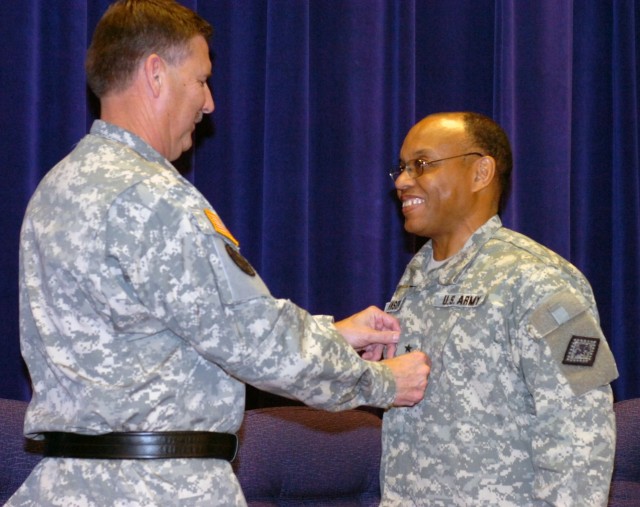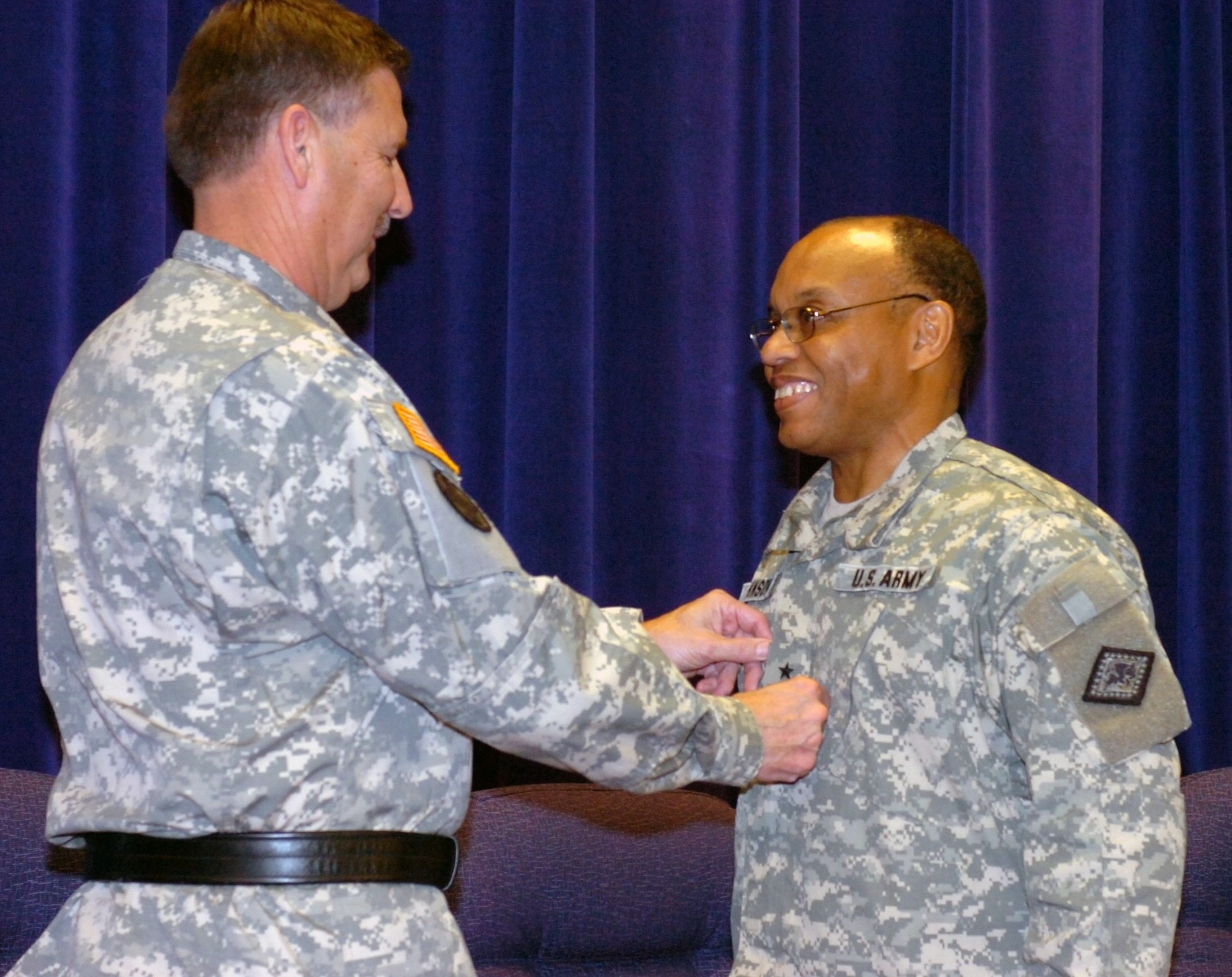CAMP ROBINSON, Ark. (Army News Service, Feb. 8, 2008) - On Sept. 4, 1957, Arkansas Gov. Orval Faubus defied the Supreme Court, calling in the Arkansas National Guard to prevent nine African-American students from entering Little Rock's Central High School. At the time, there were no African Americans in the Arkansas National Guard.
Last month, Brig. Gen. William J. Johnson became the first African-American general in the 203-year history of the Arkansas National Guard.
"The significance of 'one day' was manifested today," said retired Arkansas National Guard Command Sgt. Maj. James Bankhead, who beamed with pride as a star was customarily pounded on the chest of the first African American general in the 203 year history of the Arkansas Guard.
Brig. Gen. Johnson, 57, a native son of Arkansas, has served in the state for more than 30 years in positions of increasing responsibility to include executive officer, company commander, aide de camp, battalion commander, human resource officer, chief of the joint staff and his current position as the assistant adjutant general for the Arkansas Army Guard. He holds degrees from Vincennes University, Philander Smith College and the U. S. Army War College.
"This is a promotion that is well-earned," said Maj. Gen. William D. Wofford, the adjutant general of Arkansas. Brig. Gen. Leodis Jennings, G-3, Army National Guard, echoed those sentiments: "Brig. Gen. Johnson's promotion is significant on three levels - he is the first African American general in Arkansas, the first African American deputy adjutant general in Arkansas and the highest ranking African American in the Arkansas National Guard. He routinely sets the standard of excellence."
Johnson is known as a calm, balanced, character-centered leader with strong leadership precepts, hard work ethics and true dedication to duty. As he stood before a crowd of more than 500 supporters who attended his promotion ceremony, he thanked the pioneers upon whose shoulders he stood, recognizing their contributions to his success.
"As I look back on a career where I've served in almost every position from private to colonel, I fully realize that I stand here due to the mentorship and guidance I received during my career," said Johnson. "I know that you can't get from point A to B by yourself. Attitude is important, as is respect and discipline."
Johnson's promotion was positioned during the celebration of significant occurrences in African American history as he writes a new chapter of his own. The actual promotion was effective Oct. 16, 2007, two weeks after the nationwide commemoration of the 50th Anniversary of the Little Rock Central High Crisis and took place Jan. 5, a few weeks prior to the national recognition of the dreams and contributions of civil rights leader Dr. Martin Luther King Jr.
Johnson was 7 years old on Sept. 2, 1957, when 280 Arkansas National Guard Soldiers were called up by Gov. Faubus to prevent the entrance of nine African American students into Central High who were attempting to desegregate the school. President Dwight D. Eisenhower quickly federalized the entire force of 10,000 Guard Soldiers to remove them from the governor's command. Their mission of ensuring students were protected for the rest of the school year became one of the most significant examples of the National Guard's dual role of performing missions as directed by state or federal authorities. Johnson remembers it as a significant time in his life.
When asked about the role of the National Guard in the Central High Crisis, he noted "no one volunteered to stop African American kids from going to school. People don't understand mission, oaths and how this whole thing works. As Soldiers, we take an oath that says 'I do solemnly swear that I will support and defend the Constitution of the United States and the constitution of the State of Arkansas against all enemies, foreign and domestic. They did that then, we do it now."
"Soldiers today are better trained and more focused to perform a state and federal mission. While they are more diverse, they are still mission oriented. Soldiers will perform the mission regardless - without question," said Johnson.
"What a 'changing of the Guard' that I knew!" noted Elizabeth Eckford, civil rights pioneer and one of the original Little Rock Nine students who vividly remembers being protected by an all Caucasian force of Arkansas National Guard Soldiers. Actually, there were no African American Soldiers in the Arkansas National Guard until 1963 when 1st Sgt. Jeff Hayes joined. "Brig. Gen. Johnson's promotion shows the possibility for other Soldiers of color in the future. It's as if a huge road block has been physically removed."
Johnson saw the promotion ceremony as one of the most significant events in his life.
"I didn't know how many would attend with the 39th Infantry Brigade at Camp Shelby preparing for deployment," said Johnson. "As I looked around the room, I saw folks I knew and gained something from that I haven't seen for 20 years. I'd catch a quick glimpse of someone who helped me put my first uniform together, Soldiers I've gone on missions with, and most importantly, countless young officers who saw hope in this organization for them."
Johnson requested retired Maj. Gens. Don C. Morrow and James Ryan, former Arkansas adjutants general, to participate in his ceremony along with the current adjutant general. "Those who participated in my ceremony moved progress forward," said Johnson.
Well wishers within the crowd represented all facets of Brig. Gen. Johnson's life - community leaders, military colleagues, mentors, peers and most importantly, family. His grandson Brandon beamed with pride as he presented Brig. Gen. Johnson's general officer belt to his grandfather, to the delight and pleasure of everyone in attendance.
CSM Bankhead, Brig. Gen. Johnson's former trainer at the NCO academy, said: "I watched him advance through the enlisted ranks -- his career became the symbol for other aspiring Soldiers to model due to his desire and commitment. He could have gone either way, but I know the mentorship that he received as he matriculated made the difference. It was exhilarating to see him receive his star - there are no words for it." CSM Bankhead was one of the original members of the Arkansas Defense Race Relations Institute Training team in 1973. The team spent five years providing training to Arkansas National Guard units attempting to change the attitude and behavior within the ranks.
"I know that what retirees did came at a cost," said Brig. Gen. Johnson, and he believes that everyone can serve in the fight to develop cohesive teams. "It's all association and relationship building. With relationship building comes trust," said Brig. Gen. Johnson. "You have to sift out the values and beliefs that might have been addressed in childhood. You have to try to work toward the center and try to reach an agreement."
The quintessential mentor, Brig. Gen. Johnson notes that Soldiers must be persistent to succeed. "Look at other places and see how far along we are. You may not sprint - it takes time. Young officers don't want to wait. No one can take away what you've learned. I'd like to see more consistent change than faster. Identify opportunity, understand the culture of the organization to get through it, provide opportunities for others and make fair assessments. Don't just try to get by, request the hard jobs and prepare yourself for them.
"I have a diverse group that I mentor. I force mentorship on some to develop them. Many younger officers don't take this as seriously as more senior Soldiers who had to fight their way through the system," said Brig. Gen. Johnson.
Brig. Gen. Johnson's leadership focus is clear. He believes that it is his responsibility to assist the adjutant general as he directs his vision of building the finest reserve military organization serving the nation, state, and community collectively as a team.
"My goal as a strategic leader is to help guide the achievement of the adjutant general's vision by acquiring and allocating resources, directing policy, building consensus, influencing organizational culture and shaping the complex and ambiguous environment that we work," said Brig. Gen. Johnson. "I will assist in growing the next generation of leaders, influence organizational culture, energize subordinates, and seek opportunities to advance our organizational goals.
"Bottom line, Soldiers have to see what right looks like," said Brig. Gen. Johnson. "As a leader, you're a servant, motivator, listener, counselor and organizer. You can't get through an organization without someone helping you, and I'm obligated to do the same for others. I can't do any less."
(Maj. Eurydice Stanley serves as adjutant for the National Guard's Professional Education Center.)


Social Sharing